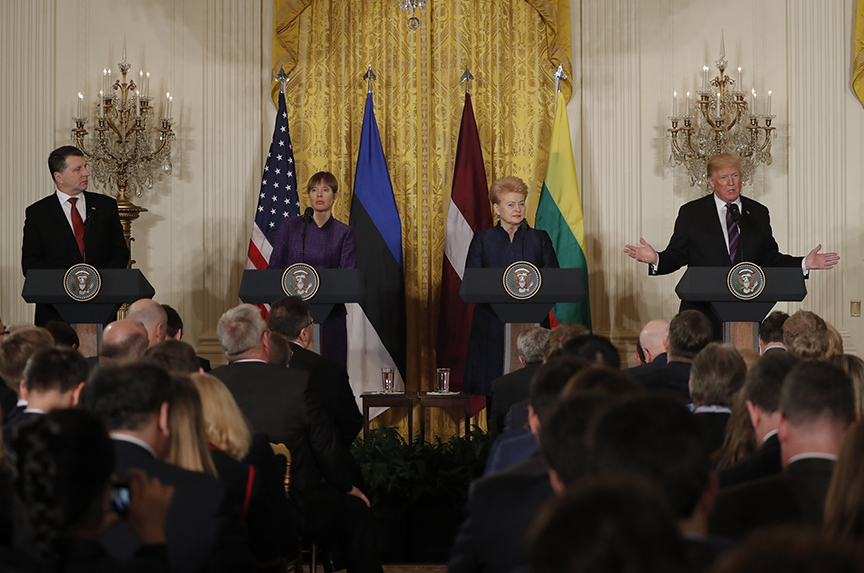 US President Donald J. Trump has assured leaders of the three Baltic States—Estonia, Latvia, and Lithuania—that no one has been tougher on Russia than him. He also said that he thinks he could have a “very good relationship” with Russian President Vladimir Putin.
US President Donald J. Trump has assured leaders of the three Baltic States—Estonia, Latvia, and Lithuania—that no one has been tougher on Russia than him. He also said that he thinks he could have a “very good relationship” with Russian President Vladimir Putin.
Trump made the comments in a joint press conference with the three Baltic presidents—Kersti Kaljulaid of Estonia, Dalia Grybauskaitė of Lithuania, and Raimonds Vējonis of Latvia—at the White House in Washington on April 3.
The Atlantic Council will host all three Baltic leaders for a dinner on April 3. US National Security Advisor Lt. Gen. H.R. McMaster will also attend the event.
The White House meeting took place amid Baltic apprehensions about Russia’s actions in its neighborhood and an ongoing investigation by a special prosecutor into links between Trump’s presidential campaign and Russia. Trump has denied any collusion took place between his team and Russia.
Two weeks ago, Trump made a congratulatory phone call to Putin on his re-election and invited the Russian president to Washington.
Trump said it “would be good thing, not a bad thing” if the United States got along with Russia.
Kaljulaid said she trusted Trump’s judgment.
Tensions between the United States and Russia have reached a high point recently following a tit-for-tat expulsion of diplomats following the poisoning of a former Russian double agent, Sergei Skripal, and his daughter, Yulia Skripal, in Salisbury, England, on March 4.
“Germany did four, France did four, we did 60,” Trump said referring to the expulsions of Russian diplomats. “There’s nobody been tougher on Russia.”
Speaking at the White House, Trump affirmed “the very strong relationship” between the United States and the Baltic states. “This summit proudly displays to the world America’s deep and lasting friendship with the Baltic nations,” he said.
Trump, who has been deeply critical of NATO members that do not meet the agreed upon 2 percent of GDP defense spending target, took credit for “many, many billions of dollars” pouring in as a consequence of his criticism.
All three Baltic states meet the 2 percent goal. Trump cited this Baltic “commitment to burden-sharing” as an example to other NATO members. “Some of them do not make the same commitment. Hopefully, they soon will,” he said.
Vējonis said that Latvia will continue to keep its defense spending commitment in order to develop its “military capabilities for the purposes of both strengthening NATO’s posture in the eastern flank and contributing to international security.”
He was appreciative of the US “commitment to deterrence policy in the Baltic region and the military assistance provided to our forces.”
Grybauskaitė, meanwhile, touted Trump’s unpredictable leadership style noting that this is sometimes necessary to produce change.
“This is good because without the leverage and pressure, there will be no additional spending in our defense in NATO. There will be no additional decisions for rotating military forces of United States in our countries. There will be no willingness to look into the matter of air defense, which we need very much,” she said.
In their meeting, all four presidents affirmed their commitment to Article 5 of the Washington Treaty, which states that an attack on one NATO member will be treated as an attack on the entire Alliance.
“Article 5 is iron clad for all of us,” said Grybauskaitė.
The Baltic states view Russia as a primary threat. With this in mind, the Baltic leaders arrived as a group in Washington seeking military support.
The White House said that the Trump administration plans to provide the Baltic states with nearly $100 million to procure large-caliber ammunition and over $70 million in train-and-equip programs to build the capacity of military and security forces of the three nations.
The United States is already building the defense capacity of these nations through security assistance programs such as Foreign Military Financing (FMF) and International Military Education and Training (IMET).
US forces take part with Baltic troops in training exercises, including SABER STRIKE and BALTOPS. The White House said that more than 5,000 US troops will join multinational forces in this year’s SABER STRIKE exercise, the largest event of its kind to take place in the Baltic region.
Troops from the Baltic states are also part of the anti-ISIS coalition.
Trump reinforced Baltic efforts to enhance energy security. These efforts will include enhancing capacities to prevent, detect, thwart and recover from cyberattacks and technical assistance to support energy diversification projects, the White House said.
The Trump administration also agreed to commit $3 million to work with the Baltic states to “build public and institutional resiliency against disinformation by strengthening independent media outlets, public service broadcasters, and media literacy skills in the region,” the White House said.
Ashish Kumar Sen is the deputy director of communications, editorial, at the Atlantic Council. Follow him on Twitter @AshishSen.
Image: US President Donald J. Trump (right) addressed a joint news conference with (from left) Latvian President Raimonds Vējonis, Estonian President Kersti Kaljulaid, and Lithuanian President Dalia Grybauskaitė at the White House in Washington on April 3. (Reuters/Carlos Barria)

